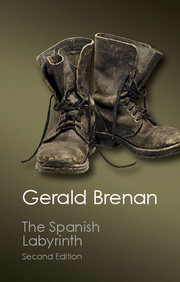Book contents
- Frontmatter
- Contents
- Foreword by Sir Raymond Carr
- Preface to the Second Edition
- Preface to the First Edition
- Chronological Table
- Political Divisions, 1873-1936. Six maps
- Part I The Ancien Régime, 1874–1931
- Chapter I The Restoration, 1874–1898
- Chapter II The Parliamentary Regime and the Catalan Question, 1898–1909
- Chapter III The Liberals and the Church
- Chapter IV The Army and the Syndicalist Struggle in Barcelona, 1916–1923
- Chapter V The Dictatorship
- Part II The Condition of the Working Classes
- Part III The Republic
- Three sketch maps
- Appendices
- Bibliography
- Index
Chapter III - The Liberals and the Church
Published online by Cambridge University Press: 05 November 2014
- Frontmatter
- Contents
- Foreword by Sir Raymond Carr
- Preface to the Second Edition
- Preface to the First Edition
- Chronological Table
- Political Divisions, 1873-1936. Six maps
- Part I The Ancien Régime, 1874–1931
- Chapter I The Restoration, 1874–1898
- Chapter II The Parliamentary Regime and the Catalan Question, 1898–1909
- Chapter III The Liberals and the Church
- Chapter IV The Army and the Syndicalist Struggle in Barcelona, 1916–1923
- Chapter V The Dictatorship
- Part II The Condition of the Working Classes
- Part III The Republic
- Three sketch maps
- Appendices
- Bibliography
- Index
Summary
The Anarchists have destroyed many churches, but the clergy had first destroyed the Church.
José Castillejo.The next seven years represent a pause in Spanish history. A few days of rioting and the fall of the Government responsible for it had released the tension that, since 1906, had been accumulating in Barcelona. The Anarchists were busy organizing a new trades union, the Confederación Nacional del Trabajo, in imitation of the French C.G.T. and in rivalry with the Socialists. The Catalan Nationalists had been frightened by the riots and were keeping quiet. Their united front, Solidaridad Catalana, had broken up over the religious question (that is to say, the tactics of the Government had been successful) and the Lliga, with somewhat reduced enthusiasm, became once again the only serious representative of Catalan ambitions. But it had been momentarily appeased by a new schedule of tariffs which gave Catalonia a complete monopoly of the home market and by a moderate measure of devolution (the Law of Mancomunidades) which after endless discussion in the Cortes it had obtained by decree in 1913. The King, too, had been warned at Edward VII’s funeral of the danger of moving too far along the path of reaction and with a change of tone that came easily to him he proclaimed himself a good Liberal and even flirted with the Republicans.
For several years therefore Conservative and Liberal governments peaceably succeeded one another and, though most of the faults of the regime remained, a real public opinion was growing up in the large towns and occasionally even asserting itself in the elections. The omens for the commencement of a more healthy state of affairs began to appear favourable. In the industrial and mining centres a series of strikes raised the wages of the workmen, and the Conservatives interested themselves in improving their condition by legislation.
- Type
- Chapter
- Information
- The Spanish LabyrinthAn Account of the Social and Political Background of the Spanish Civil War, pp. 58 - 88Publisher: Cambridge University PressPrint publication year: 2014



